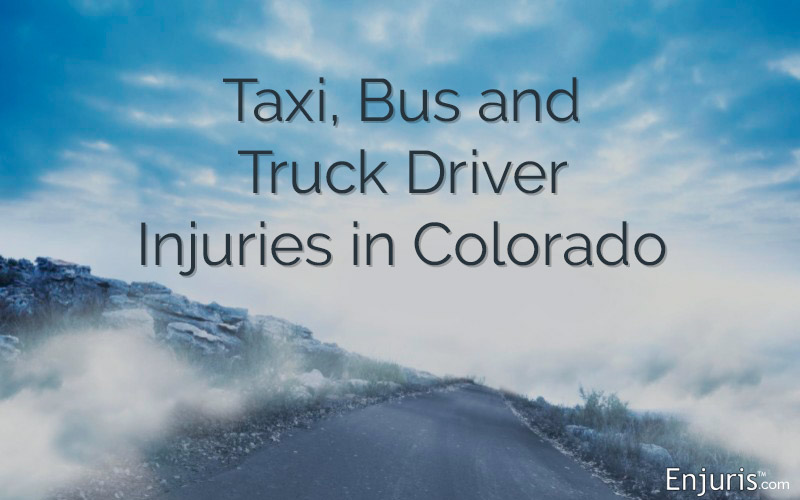When you're injured while carrying other passengers
When you’re in charge of a metal tank like a truck, you feel like you are in control of the road. Measly peasants can scatter out of your way! It might not be that way with a taxi or a cab – even something like a Lyft is still a regular car most of the time, unless you’re driving a Hummer – but at least an 18-wheeler offers some modicum of control, right?
That is, until the moment when you hit something.
The operators of a common carrier (vehicles that offer transportation for a fee as part of a business) like a truck, bus or taxi have many considerations when they get into an accident, including how to take care of themselves and make sure they aren’t held personally liable for whatever happened. The problems that the injured have after any car accident are compounded when common carriers are involved. Let’s take a look at how and why.
How do "common carriers" fit into personal injury law?
Any individual or business that transports people, goods or services in exchange for money is considered a common carrier, so your Hostess trucks, Bolt buses, interstate ferries, you name it. They must offer their services to the general public and be licensed by a regulatory governmental body, but they can be both private and public entities. They can include anything from a taxi to a school bus to a train to a ferry ship. Anything that crosses state lines is controlled under the Interstate Commerce Act, and individual states can regulate travel on a local level within their own borders.
Because these businesses offer services to the public and require payment before anyone can board, they are held to a higher duty of care. Regular drivers, on the other hand, are held to a standard of reasonable care. What would a driver like that do under similar circumstances? What would be considered reasonable by a jury of his peers?
Common carriers, by contrast, must use the highest degree of care for their passengers’ safety. Failure to do so is considered negligence. If someone is injured because of a ferry driver hits another boat or a Lyft driver runs a stop sign, that higher standard of care will apply.
However, many common carriers are governmental entities, so keep in mind that a different statute of limitations will apply. While the statute of limitations in Colorado for personal injuries is three years, against governmental entities it is 180 days.
There might also be a special notice period to which the injured party must adhere prior to filing his or her lawsuit. This is why speaking with a personal injury attorney is imperative; if the statute of limitations is only 180 days, you have very little time both to investigate and to file a claim before your suit is barred forever.
What contributes to accidents with common carriers?
Just like a normal car accident (if any car accident can indeed be called "normal"), a wide variety of things can cause accidents involving common carriers. These can be instances like:
- Drivers new to the road
- Driver negligence
- Inattention
- Sleepiness/excessive fatigue
- Driving under the influence
- Lack of truck maintenance
- Tire blowout
- Inadequate training
- Speeding
- Aggressive driving behavior
- Overcrowding
- Mechanical failure
What should a driver do if he’s been in an accident?
First of all, stay calm. Check yourself for physical injuries. If you are injured, seek medical attention.
Help anyone else in your vehicle who needs medical attention, and get your vehicle out of the flow of traffic if you can. If you can’t move your vehicle because of damage, at least put on your hazard lights.
Even if you are the offending driver, you will still want to collect information for a police report. This will help your attorney later on. Being a common carrier in an accident means that more likely than not, you and your company are going to be sued. You are going to be deposed at some point in time by an attorney, and you are going to need to remember what happened during these crucial moments. So, if you haven’t printed out a post-accident incident report to keep in your glove compartment, here is the vital information you should try to write down:
- The name and address of the other (perhaps offending) driver
- Contact information (this is the most important)
- License plate
- Date and time of day of accident
- Description of cars involved (year and make of vehicles)
- Description of damage to the vehicles
- Were seatbelts used?
- Take pictures if you can
- Lease? Owned? Rental?
- Insurance information (policy number and point-of-contact person)
- Injury details and medical contact information
- How and where the accident happened (draw pictures if necessary and include weather conditions)
- Witness contact information
If nothing else, get the contact information for the other driver and for witnesses. They might leave town, they might be visiting the state, nobody really knows.
Because you are employed with a common carrier, your employer will most likely be held responsible under the theory of respondeat superior, or "let the employer answer." This means that a person’s boss is usually responsible for whatever the employee does wrong during work hours. So, if you injured someone while on the clock, your employer is potentially responsible for that victim’s subsequent medical bills.
This can get confusing with Uber services and other ride-sharers. They are technically Transportation Network Companies, or TNCs, and do not hold livery licenses or the same insurance that cab drivers do.
Each state has the potential to handle this differently, but in Colorado, for instance, a bill was passed that says while the Uber ride-sharing app is turned on, the driver’s primary liability coverage shall cover the passenger. TNCs in Colorado must carry $50,000 per injured passenger, $30,000 for property damage and $100,000 for all injuries arising per accident.
What else is different in Colorado?
There isn’t any one body of "common carrier law" that spells out differences between this and other types of law, so it is more of a challenge of reading between the lines. A victim of personal injury in Colorado will still have to establish negligence on the part of the defendant, but there will be interesting twists, like ride-sharers Terms of Use, for instance.
In Colorado (as well as other states), Uber’s terms of use include a binding arbitration clause, so injured passengers can’t file a lawsuit without trying alternative dispute resolution first. Meanwhile, under Colorado law, drivers are only required to maintain a minimum amount of insurance coverage, which includes:
- $25,000 per person for bodily injuries
- $50,000 per accident for bodily injuries
- $15,000 per accident for property damage to the injured party.
This doesn’t mean you can’t get additional insurance or uninsurance (which is a must if someone hits you and they are uninsured; what are you going to collect against?).
Another question is if the Uber driver an independent contractor or an employee. Respondeat superior only works if someone is actually employed. Independent contractors have more control over their schedules and determine their own hours.
In terms of insurance for bus accidents, depending on the state, it might be a single pool of money that covers all injured passengers (this, of course, presents limitations if injuries are considered significant or catastrophic), or it might be individual policies.
Commercial trucks, meanwhile, must carry at least $750,000 in liability insurance, and are heavily regulated within the state for both size and weight. Some restrictions include:
- Weight cannot exceed 85,000 pounds (CRS 42-4-508)
- Truck and trailer together cannot exceed 85 feet (CRS 42-4-505)
- Height cannot exceed 13 feet (CRS 42-4-504)
- Width of truck or load cannot exceed 103 inches (CRS 42-4-502)
Also considering that Colorado has a chain law for steep mountain climbs, if drivers are not abiding by those laws (or if the accident was the result of a type of harm that the safety regulation was trying to avoid), that can lead to a question of whether the employer is liable under "negligence per se."
If you are a common carrier who injured your passengers, you should speak with a Colorado attorney as soon as possible. The rules are constantly evolving for ride-sharers, and even dealing with something "straightforward" like a bus accident can be absurdly complicated, considering the number of individual claims involved. Let a lawyer help you sort through everything.
See our guide Choosing a personal injury attorney.


